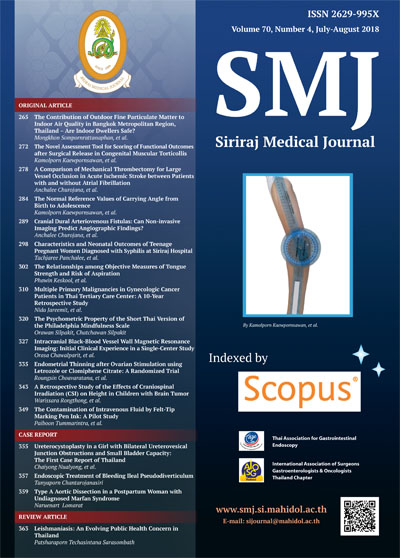The Psychometric Property of the Short Thai Version of the Philadelphia Mindfulness Scale
Keywords:
Philadelphia Mindfulness Scale; psychometric; Thai versionAbstract
Objective: To develop and investigate the psychometric property of the short Thai version of the Philadelphia
Mindfulness Scale (PHLMS).
Methods: The pooled data from the mindfulness invention studies between 2011 and 2014 were analyzed. The items
of original version were selected by 3 methods i.e., mean difference between the two groups of high score and low
score by t35-test, researchers’ opinion and corrected item total correlation. Two forms of short Thai version were
developed. These forms were analyzed by using exploratory factor analysis (EFA) in randomly selected 303 cases
and only the selected form was confirmed by confirmatory factor analysis (CFA) in 873 cases by using the Mplus
program. The goodness of fit indices was determined by Chi-square index, root mean square error of approximation
(RMSEA), comparative fit index (CFI) and Tucker Lewis Index (TLI). Pearson’s correlation was used to analyze
the discriminant validity with Hospital Anxiety Depression Scale (HAD).
Results: Only the researchers’ opinion version (ROV) containing 10 items was confirmed by CFA and had factor
loadings between 0.50-0.80. The goodness of fit was acceptable. The ROV and each domain (awareness and acceptance)
had acceptable composite reliability at 0.86, 0.72 and 0.83 respectively.
Conclusion: The short version of PHLMS contained 10 items and demonstrated the good validity among clinical
cases, beginners in meditation practice and care givers; and could classify people with different frequencies of
meditation practice.
Downloads
Published
How to Cite
Issue
Section
License
Authors who publish with this journal agree to the following conditions:
Copyright Transfer
In submitting a manuscript, the authors acknowledge that the work will become the copyrighted property of Siriraj Medical Journal upon publication.
License
Articles are licensed under a Creative Commons Attribution-NonCommercial-NoDerivatives 4.0 International License (CC BY-NC-ND 4.0). This license allows for the sharing of the work for non-commercial purposes with proper attribution to the authors and the journal. However, it does not permit modifications or the creation of derivative works.
Sharing and Access
Authors are encouraged to share their article on their personal or institutional websites and through other non-commercial platforms. Doing so can increase readership and citations.











